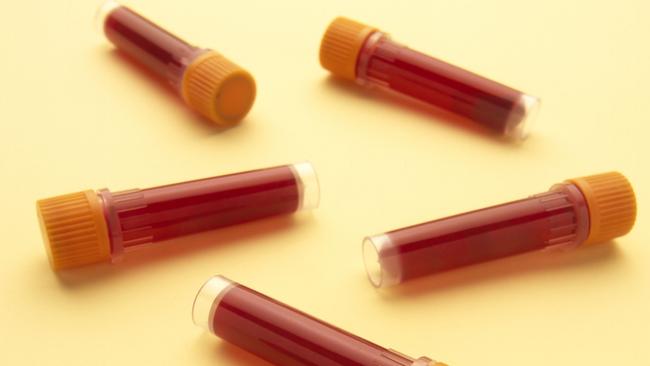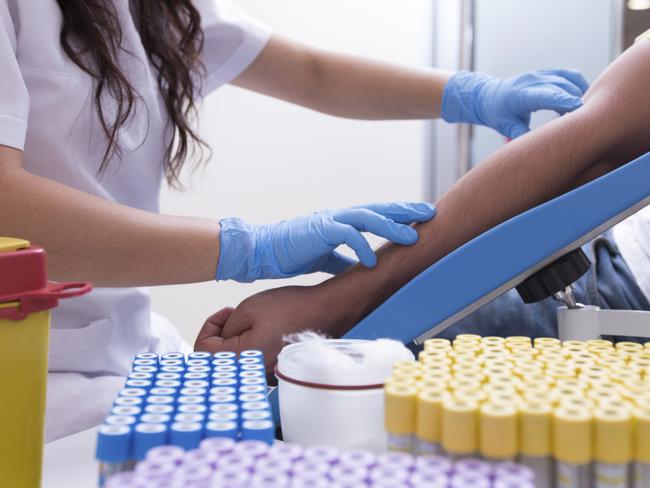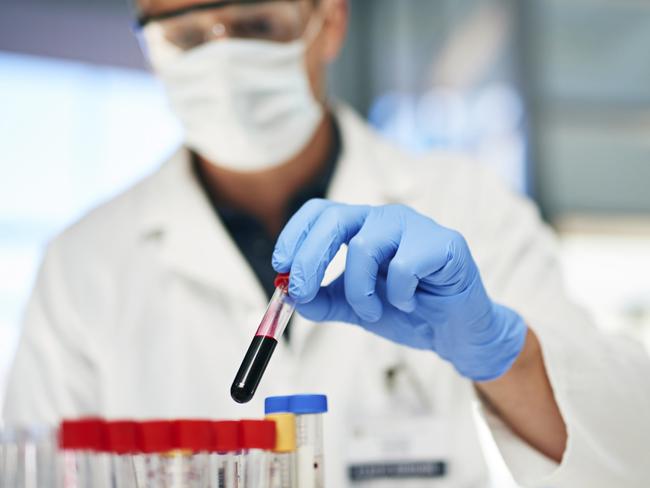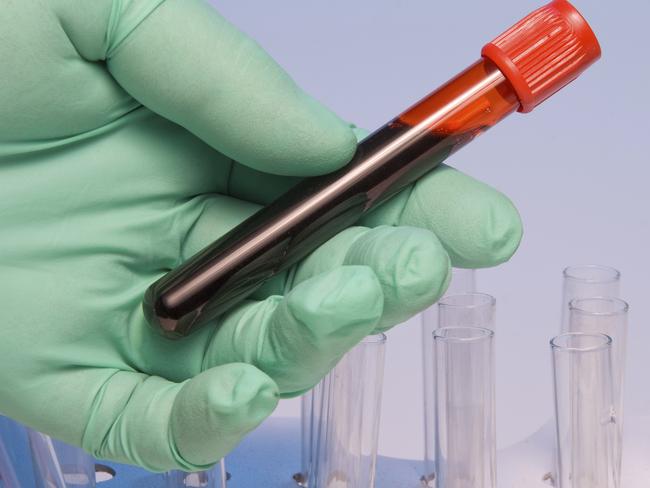Blood test dinner parties coming soon to a house near you
DINNER parties that come complete with a blood test analysis to check for nutritional deficiencies are the latest big thing for the super health conscious. So should you indulge?

Body+Soul Daily
Don't miss out on the headlines from Body+Soul Daily. Followed categories will be added to My News.
DINNER parties that come complete with a blood test analysis to check for nutritional deficiencies are the latest big thing for the super health conscious. So should you indulge?
THE host is busy in the kitchen preparing dinner. There’s a Moroccan carrot salad with pomegranate and mint alongside grilled chicken and fish, followed by a delicious-looking fruit and chocolate dessert. Guests happily mingle in the dining room as they wait for their much-anticipated meal.
It seems like a standard healthy dinner party scene, but there’s a catch. Before a forkful of food passes any lips, the guests — who’ve all been fasting for six hours roll up their sleeves and a phlebotomist (a blood-drawing specialist) collects a blood sample. Welcome to the blood test dinner party, coming soon to a house near you.
Guests kick off the night by giving a blood sample, then go on to dine with a nutrition expert, during which they learn about common deficiencies and health issues and how diet can influence them, as they tuck into a delicious healthy meal. Test results are available a few days later, with individual follow-up sessions to discuss issues such as low iron or high cholesterol or blood glucose levels.

It’s a trend that began in the UK earlier this year, thanks to doctor-turned-chef-and-nutritional-scientist Toral Shah. Since launching her health optimisation parties in London earlier this year, Shah has had a steady stream of mostly professional 30-to-50-somethings book her services.
At more than $400 a head, a dinner like this doesn’t come cheap. But Shah says time-poor people who want to stay as healthy as possible, for as long as they can, make up the majority of diners at the table. They see getting their nutrition right as key to living a long and healthy life.
“People want to know how they can make a difference,” Shah says.
“They may have some health issues, or they see their parents ageing and they realise they’re not invincible any more and may need to change some things now to prevent disease later.”
THE POWER OF A BLOOD TEST
SO, how useful is a blood test for the average person concerned about their health? Shah says it can confirm a suspected condition but also deliver a surprise: “A blood test gives you hard evidence — you can’t just look at someone and say they’re deficient in this or might have that. I’ve seen thin people with high levels of fat and high cholesterol and I’ve seen someone who looks a little overweight but they don’t have any markers for diabetes.”
Shah has also seen an increase in people with vitamin D deficiency, which echoes the situation in Australia, where almost one in three of us is now considered to be deficient.
“A vitamin D deficiency can be linked to an increased risk of heart disease and diabetes, so it’s important to address.”
Dr Jason Mallia is a clinical nutritionist at Integrated Health in Sydney. Like Shah, he also uses blood tests to help identify or confirm nutritional deficiencies.
“Blood tests give you a baseline of where you may be at on a nutritional level,” Mallia says.
“I see a lot of people who arrive with bags of supplements that they’ve been taking without any prior testing. If the body doesn’t need those supplements, they’re just making expensive urine and working their liver and kidneys harder than they need to.”

Mallia adds that blood tests measure some vitamins and minerals more accurately than others. Levels of iron, vitamin D and red blood cell folate can usually be calibrated well but it’s harder to get accurate measurements of folic acid and zinc. He usually combines a blood test with other diagnostic methods, such as hair analysis that looks at what nutrients are in the body at a cellular level.
“Most people operate at a 60-70 per cent level of health, and tests like this can help them move up the wellness scale.
When you identify and introduce the nutrients they’re lacking, they have more vitality and feel more alive,” he says.
“There’s value in having tests to see where you’re at nutritionally.”
But Kate Gudorf, a spokesperson for the Dietitians Association of Australia, is wary of the blood-test-and-dinner-party combination.
“Blood tests are important for detecting nutritional deficiencies and for potential conditions such as high cholesterol or high blood glucose levels, but I’m not so sure of the benefits of going on a ‘fishing expedition’ in an otherwise healthy population,” she says.
“I could give a small group of people a battery of tests and find something ‘wrong’ with any number of them — and by ‘wrong’, I mean a blood result outside the target range. But I think results need to be interpreted with someone’s complete medical history and in context.”
Gudorf adds that on any day, blood levels can fluctuate, depending on factors like the medication they may be taking, whether they’re stressed or dehydrated or are getting over a recent infection.
“Blood tests are a better idea when you suspect that something is wrong, or you know you have a condition that could potentially lead to a nutritional deficiency,” she says.
FRIENDS WITH HEALTH BENEFITS
SHAH says dinner with friends or family is the ideal setting to discuss any niggling health concerns you have, look at the dietary and lifestyle changes you’d like to make, and to start gathering hard evidence about the state of your health.
After all, you’re with people who know you best and care about you.
“That’s partly the success of organisations like Weight Watchers — you lose weight with other people, support each other and make yourself more accountable,” she says.

Gudorf disagrees: “Why take a pleasurable experience of a meal with friends and scrutinise the health value of everything you then put into your body?”
It’s a fair question. But while some people prefer to keep blood tests and health issues between themselves and their doctor, there’s clearly a desire in the general population to go on a health journey with others.
“A lot of friends get together for dinner and find the conversation turns to health,” Shah says. “[Blood test dinner parties] give them scientific evidence to work with, they can talk about the changes they want to make to improve their health, and then get support from the people around them.”
WHAT A BLOOD TEST CAN REVEAL
CHOLESTEROL
Your GP may check your cholesterol if you have a family history of early cardiovascular disease; a close family member with high cholesterol, high blood pressure or diabetes; or if you’re overweight.
One-third of Aussies have high cholesterol, according to the Heart Foundation.
GLUCOSE
Diabetes is diagnosed by a blood test that measures your blood glucose levels.
It may be recommended if you’re thirstier than usual; urinate more than usual, feel more tired, or wounds heal slowly. However, many people with type 2 diabetes have no obvious physical symptoms.
THYROID FUNCTION
A thyroid stimulating hormone check can help detect a thyroid disorder — usually an overactive or underactive thyroid — which can affect your metabolic function. About 14 per cent of older Australians have a thyroid disorder.
LIVER FUNCTION
A liver function test shows how well — or how poorly — your liver is working.
A blood test measures the proteins and enzymes produced by liver cells.
Your GP may suggest this blood test if you have symptoms such as jaundice, weakness, loss of appetite, dark urine, abdominal pain or swelling, and nausea.
